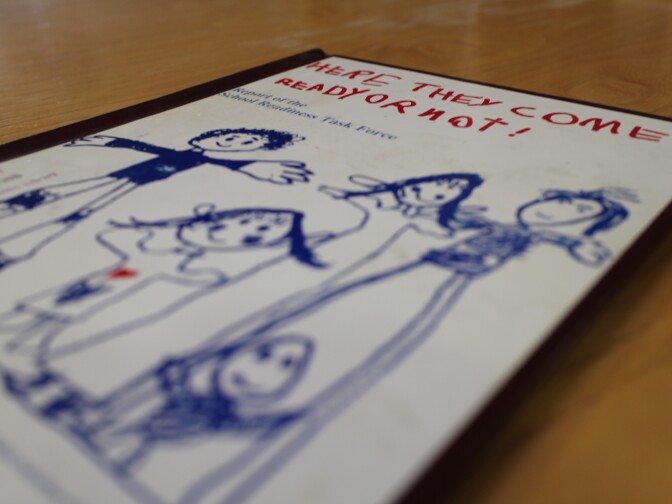With our free press under threat and federal funding for public media gone, your support matters more than ever. Help keep the LAist newsroom strong, become a monthly member or increase your support today.
New effort to reform early education gives some a sense of deja vu
The line behind the microphone snaked down the aisle, as two dozen people stepped up to advocate for their slice of the early childhood education pie.
Several members of the local education workers union argued for collective bargaining rights for child care workers. A representative from the research policy center Zero to Three spoke up "on behalf of the near 1.5 million infants and toddlers in California," while someone from First 5 LA mentioned the need for more transitional kindergarten opportunities for four-year-olds.
It was the second public hearing of California's Blue Ribbon Commission on Early Childhood, a group created by the speaker of the California State Assembly Anthony Rendon with the aim of unifying the sprawling early childhood field.
Unlike the K-12 system, where funding, curriculum and training for teachers is centralized in the department of education, the early childhood system is splintered. Funding comes from a mix of federal, local and non-profit streams, services are administered by health and social service agencies, bordering the territory of schools and families.
"The field is very broad and very diverse," said Rendon, "and I think to build a platform where there’s conversations taking place is really important and will help to move the field forward."
But this is not the first statewide effort to move things forward, and those who have worked in the field for a long time have a slight sense of deja vu. A similar task force tried to reset the early childhood agenda almost three decades ago – and the majority of the problems that task force addressed remain unsolved.
"The issues that were confounding people nearly 30 years ago and still confounding them now," said Rick Simpson, who served as a top staffer in the legislature for nearly 40 years – an education advisor for nine assembly speakers.
Simpson was part of an early education task force organized by the California State Department of Education in the late 1980s. At the time, educators were concerned that preschool and kindergarten were becoming too academically rigorous. So superintendent of public instruction Bill Honig, brought together 20 educators, researcher and advocates across the state to gather data around school readiness and create policy recommendations. The task force made national news, mentioned in a piece on NPR's "All Things Considered."
But after the School Readiness Task Force released its report in 1988 – titled "Here They Come: Ready Or Not" – no major policy changes materialized.
There’s a copy of the report in the L.A. Public Library downtown. I checked a copy out (the first time this had been done in 13 years) and showed it to Speaker Rendon. He’d never heard of it.
“Wow,” he said thumbing through report, which is bound like a hardcover children's book. “Fascinating – not much has changed."
"The fact that a lot of this hasn’t been fully implemented says a lot about the need for these type of platforms and the need for folks to work together," Rendon said.

The 1988 report includes 12 recommendations for the early primary years, including:
- An appropriate, integrated, experiential curriculum should be provided for children ages four through six
- Programs should meet the special needs of our culturally and linguistically diverse students, as well as the needs of exceptional children
- The staff of the early primary programs should receive appropriate education, training and renumeration
- Funding and support must be made available for the early primary years
"The reaction to it was, 'Oh my gosh, they’re right – the right recommendations blah blah blah,' but the implementation of those recommendations didn’t really go anywhere," Simpson recalled.
But the timing wasn't right. A couple years after that report, in the early '90s, the state fell into a recession. By the time the budget started growing again in 1996, class-size reduction was the new priority.
"You have to have leadership – in both the legislature and governor – who care about it, you have to have a fiscal situation that provides the resources to make those kinds of expansions and quality improvements," said Simpson.
"It’s like a solar eclipse or something. All of the heavenly bodies have to align themselves at the right place, the right time."
Kim Patillo Brownson, vice president of policy and strategy at First 5 LA, is hopeful that those elements are in the process of locking into place.
"We’re in a pretty unique moment that I think is palpably different than when other commissions existed," she said. "We have a strong economy and political leaders who have the potential to be in power and authority for several years into the future and that’s an alignment we have not had in the last ten years."
Speaker Rendon and Senate Budget Committee Chair Holly Mitchell actually worked in the child care field and the California Legislative Women’s Caucus has made parental leave and early childhood a central issue. Rendon also hopes to use the political alliance that will prevent budget cuts to child care and preschool that have occurred in the past and to create allies in the business community to secure financial investments.
"It does give me hope," said Simpson. "But you gotta be in it for the long haul."
He worked on school facilities reforms that took 13 years to pass. With follow through and persistence, he believes this new commission can be effective.
"In 30 years, you’ll be doing a retrospective about how whatever we end up doing – hopefully in a few years," said Simpson, "made such a tremendous difference in kids’ lives."









